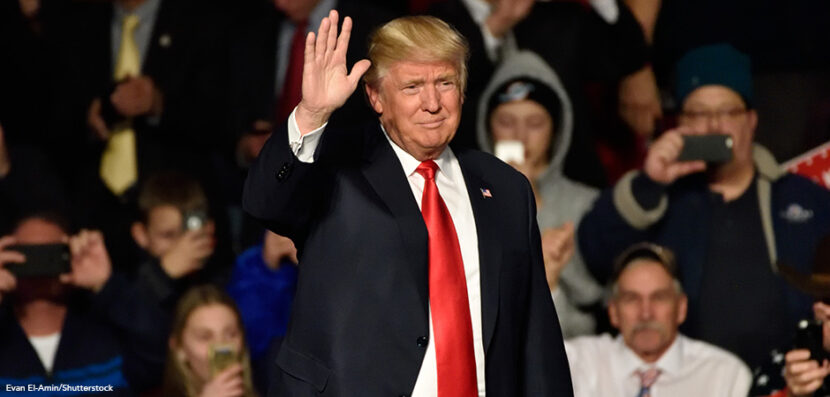Trump and Biden Win South Carolina and Michigan Primaries
Former President Donald Trump easily won the Republican presidential primaries in South Carolina and Michigan. On February 24, 2024, Trump won almost 60 percent of the South Carolina votes cast. Former United Nations ambassador Nikki Haley, the only remaining Republican challenging for the nomination, won nearly 40 percent.
President Joe Biden won over 95 percent of the votes in the Democratic Party primary in South Carolina.
Then, on February 27, Trump received about 68 percent of the votes cast in Michigan according to unofficial results tallied the day after. Haley received about 26 percent of the votes.
President Biden also won in Michigan and continued his advance to officially claiming the party nomination. The South Carolina and Michigan Democratic contests were moved earlier in the primary calendar to diversify the voting base. Michigan has influenced the outcome of the last two presidential elections. Trump’s win in 2016 and Biden’s win in 2020 played key roles in their victories.
South Carolina: A Disappointing Loss for Haley
Nikki Haley was born in South Carolina in 1972. She served as South Carolina’s governor from 2011 to 2017. It is uncommon for candidates to lose their home state in an election, but Haley did. She won in Beaufort, Charleston, and Richland counties. Charleston and Richland counties are the home of the state’s two largest urban areas. Exit poll data show that Haley outperformed Trump among urban voters, but Trump had wider advantages among suburban and rural voters in South Carolina.
Analysts believe that Trump was able to beat Haley in South Carolina because he was endorsed, or publicly supported, by dozens of well-known Republican officials who live there. Over the last several months, Trump was endorsed by 158 former and current South Carolina officials, including mayors and sheriffs. Haley was only endorsed by one member of the U.S. House of Representatives, 11 current South Carolina state lawmakers, and two mayors.
Haley’s Next Move
Haley has lost to Trump in every primary since the election contests began in January. Polling numbers before each of the elections consistently show Trump with a significant lead over Haley. Just days before the South Carolina contest, polls showed Haley trailing Trump, 30 percent to 65 percent. Even so, Haley vowed to continue her campaign through March 5, known as Super Tuesday, when almost one-third of the total delegates are decided. Fifteen states and American Samoa, a U.S. territory, will hold their primaries on that day.
Haley believes she still can win the presidential nomination. Within 24 hours of her South Carolina loss, she announced that grassroots supporters had given $1 million to her campaign. Unfortunately, at the same time, Haley’s election team lost a valuable partner. The Americans for Prosperity (AFP) super PAC declared that it was no longer giving financial support for her presidential bid. A super PAC (political action committee) can raise unlimited amounts of money to support or oppose federal election candidates. Super PACs, however, are not allowed to directly contribute money to a candidate.
The AFP super PAC is backed by billionaire conservative businessman Charles Koch. It has spent millions of dollars since the fall of 2023 on advertising and campaigning efforts for Haley. AFP stated that it would continue to support Haley but would be using its money to help Republicans win several key Senate and House races. The super PAC believes that its money will be best used for those election bids.
Challenges for Biden in Michigan
President Biden’s win in Michigan did come with a challenge. 100,896 voters chose “Uncommitted” instead of a specific candidate. There was an organized protest effort by Arab and Muslim American Democratic voters. These protesters are part of an effort called “Listen to Michigan.” They are critical of President Biden’s support of Israel’s action in its war with Hamas that began in October 2023.
The “Listen to Michigan” protest effort was endorsed by the state’s representative Rashida Tlaib and a former Michigan representative, Andy Levin. They are trying to influence the president’s Middle East diplomatic efforts. The over 100,000 “Uncommitted” votes in Michigan are 13.2 percent of the total Democratic votes cast on Tuesday. Michigan has allowed Uncommitted primary votes since 2012. In that year, 10.7 percent of Democrats voted Uncommitted instead of for Barack Obama. So, it is not clear how many of these votes represent concerns about the president’s foreign policy in the Middle East.
Trump Versus Biden?
Currently, Trump has won all the Republican contests for the 2024 presidential nomination. This also includes caucuses in Iowa, Nevada, and the U.S. Virgin Islands, as well as the New Hampshire primary. President Joe Biden has won all the Democratic caucuses and primaries as well. All of this suggests that the 2024 general election will be a rematch of the 2020 election between Trump and Biden.
Looking Ahead
Super Tuesday is the next important date in the party nominating process. On March 5, primaries or caucuses will be held in 15 states and the territory of American Samoa. The states are spread across the country—from Alabama, North Carolina, Texas, and Arkansas in the South to California and Utah in the West, and Vermont in the Northeast This wide range of voters and places will provide the clearest picture yet on the strength of Biden’s and Trump’s campaigns.
The Republican nominee needs 1,215 delegates to win the nomination. With the delegates from Michigan, Trump now has 119 and Haley has 22. The nominee will be formally chosen at the Republican National Convention in Milwaukee in July.



